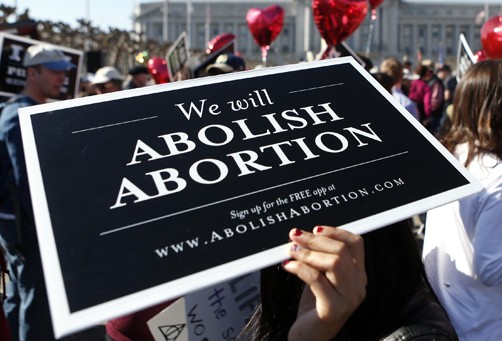In the early weeks of the 114th Congress, Republicans have made abortion access their top priority — that is to say, they’ve made curtailing access number one on the list. On Thursday, the House is scheduled to vote on the GOP-backed Pain-Capable Unborn Child Protection Act, a bill that would ban virtually all abortions after a fetus is 20 weeks old. Despite being based on dubious junk science, the bill has been resuscitated repeatedly and could provide a key method for anti-choicers to destroy Roe v. Wade, who deny that overcoming Roe is their intention.
Counterpoint: That is exactly what the bill is about. According to Mother Jones’ Molly Redden, the push for 20-week abortion bans began shortly after the Supreme Court’s decision in Roe, and by the mid-1980s they comprised anti-choicers’ earliest efforts at enforcing TRAP laws:
That’s when a Northwestern University law professor named Victor Rosenblum proposed that abortion opponents should seek to pass laws that gnawed at its edges, and hope that judges would let those revisions stand. The so-called incrementalists notched their biggest victory in 1989, when the Supreme Court upheld parts of a controversial Missouri law that required doctors to perform costly viability tests before performing abortions for women who appeared to be at least 20 weeks pregnant. […] The liberal justices went as far as drafting a dissent that read, “Roe no longer survives.”
Samuel Lee, who wrote that provision of the Missouri bill while he was a lobbyist for Missouri Citizens for Life, says the 20-week requirement “was designed as an opportunity to attack [Roe]” and the viability framework it established. “The 20-week gestational age was chosen to push the envelope on when the state’s interest in protecting the life of the unborn could take place,” he explains. “It was chosen because it was earlier than the earliest limits of viability at the time, but not so early that the unborn child could never be viable.”
But varying contentions about fetal age — which differ based on whether one starts counting at the date of a woman’s last menstrual period, as the medical community does, or by counting the weeks from fertilization, as advocates of the 20-week abortion ban would have it — betray the push. 20-week abortion bans, as proposed by Congress and enacted in 12 states, apply in practice to 22-week-old fetuses, pushing the limits of viability with inaccuracies.
And (though it’s doubtful) that could be why some GOP legislators have begun to withdraw support for the 20-week abortion ban. On Tuesday, Republican Reps. Renee Ellmers and Jackie Walorski publicly requested to remove their names from the bill, after expressing concern over the ban’s narrow exception for victims of rape and incest and concerns that the law could alienate young voters.
Their apprehension isn’t unfounded: as Redden points out, bans on later-term abortion tend to overlook the lived experiences of women who seek them, often because of dangerous fetal anomalies. Concern for those women has fired up younger voters, and presented a new challenge to the GOP: to stand by the phony science of “fetal pain,” or to call the law what it really is — an attack on Roe, and on women.

